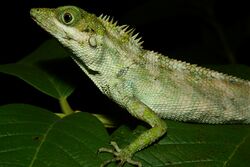Biology:Calotes andamanensis
| Calotes andamanensis | |
|---|---|

| |
| Calotes andamanensis | |
| Scientific classification Error creating thumbnail: Unable to save thumbnail to destination
| |
| Domain: | Eukaryota |
| Kingdom: | Animalia |
| Phylum: | Chordata |
| Class: | Reptilia |
| Order: | Squamata |
| Suborder: | Iguania |
| Family: | Agamidae |
| Genus: | Calotes |
| Species: | C. andamanensis
|
| Binomial name | |
| Calotes andamanensis Boulenger, 1891[1]
| |
Calotes andamanensis is an agamid lizard found on the Nicobar Islands and the Andaman Islands.[1] It is also known as the green crestless forest lizard,[1] Andaman and Nicobar forest lizard,[2] Andaman lizard, or Andaman green calotes.[3]
The holotype of Calotes andamanensis is an adult male from Nicobar Islands, India; collected by Frederick Adolph de Roepstorff in 1882.[1][4]
Description
Calotes andamanensis has been noted as having enlarged keeled scales on caudal surface of thigh, obtusely keeled scales over head, smooth dorsal body scales (uppers six rows directed posterodorsally, remainder posteroventrally). It lacks body crest, antehumeral pit present. Calotes andamanensis has 67 scales around its midbody. Its third toe is shorter than its fourth toe. This species is distinguished from Calotes aurantolabium in having smooth dorsals, dorsal body scales unequal, upper six scale rows larger, remainder equal in size to ventral scales; three enlarged scales on caudal thigh; dorsal head scales obtusely keeled; parietal ridge raised; enlarged scale between nuchal crest and tympanum; antehumeral pit present; toe-IV longer than III; stretched hindlimb reaches eye. Distinguished from Calotes versicolor and Calotes liocephalus groups and C. rouxi and C. ellioti in presence of enlarged keeled scales on caudal surface of thigh. Distinguished from Calotes versicolor group lizards in scale orientation – distinguished from Calotes versicolor in having an antehumeral pit; distinguished from C. nemoricola and C. grandisquamis in having equal size dorsal and ventral scales, toe-IV longer than III, scales around midbody 67 (36-43 and 27-35 respectively); distinguished from C. calotes in lacking flattened spines above tympanum. Distinguished from C. ellioti and C. rouxi in having an antehumeral pit and in lacking spines. It is distinguished from the species Calotes liocephalus and similar lizards (C. ceylonensis, C. desilvai, C. liolepis, C. nigrilabris) in lacking spines on the head. It is distinguished from C. liocephalus by midbody scale count and body crest.[1]
It originally included the species now described as a distinct species, Calotes aurantolabium.[5] The description given here is used in the newer sense, rather than the one of by Ishwar and Das.[6]
References
- ↑ 1.0 1.1 1.2 1.3 1.4 Pseudocalotes andamanensis at the Reptarium.cz Reptile Database. Accessed 17 January 2015.
- ↑ "Pseudocalotes andamanensis". BioLib. 2014. https://www.biolib.cz/en/taxonnames/id186941/. Retrieved 17 January 2015.
- ↑ "Wildlife news". Reef & Rainforest. http://www.reefandrainforest.co.uk/wildlife-news.php. Retrieved 17 January 2015.
- ↑ Zoological Museum collection, Københavns Universitet, Copenhagen, Denmark (ZMUC) 36944
- ↑ Krishnan, S. (2008). "New species of Calotes (Reptilia: Squamata: Agamidae) from the southern Western Ghats, India". Journal of Herpetology 42 (3): 530–535. doi:10.1670/06-198.1.
- ↑ Ishwar, N.M. & Das, I. 1998 Rediscovery of Calotes andamanensis Boulenger 1891, and a reassessment of the type locality. J. Bombay Nat. Hist. Soc. 95: 513-514
Further reading
- Boulenger,G.A. 1891 On new or little known Indian and Malayan reptiles and batrachians. Ann. Mag. nat. Hist. (6) 8: 288-292
Wikidata ☰ Q2934376 entry

